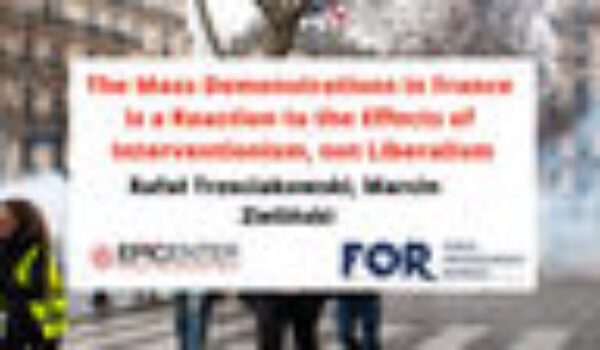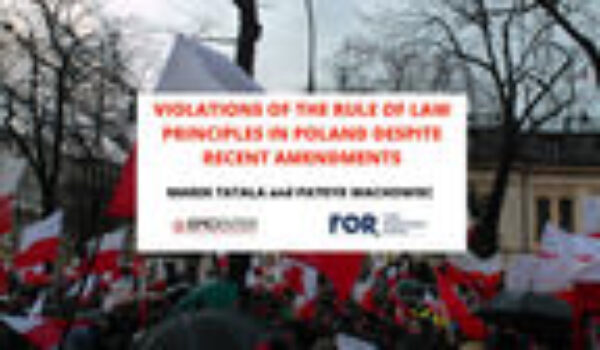
Leszek Balcerowicz, Aleksander Łaszek: Poland’s economic miracle won’t last, POLITICO
Since coming to power in 2015, Poland’s ruling Law and Justice (PiS) party has captured state institutions, attacked the independence of the courts and violated the basic norms of the legislative process.
Despite these controversial moves, the government has maintained a high level of support among Polish voters. In large part, that’s because the Polish economy is still surprisingly strong.
czytaj więcej
Marcin Zieliński: Marnujemy przez zakupy na zapas, Rzeczpospolita
Zwolennicy interwencjonizmu chcą rozwiązywać każdy problem regulacją. Tak jest z marnowaniem żywności, gdzie rozwiązaniem ma być ustawa nakładająca na sklepy obowiązek przekazywania jedzenia bankom żywności.
czytaj więcej
Marek Tatała: Czy tak umierają demokracje i jak ich bronić?, Liberté!
W wydanej przez Fundację Liberté! książce Tak umierają demokracje Steven Levitsky i Daniel Ziblatt, dwaj naukowcy związani z Harvard University, analizują przebieg i metody rozmontowywania ustrojów demokratycznych. Swoje wnioski wykorzystują następnie do oceny zagrożeń, jakie dla amerykańskiej demokracji stanowi Donald Trump, a ocenę tę poprzedzają analizą przyczyn wygranej Trumpa w wyborach prezydenckich w Stanach Zjednoczonych.
czytaj więcej
Marek Tatała: Czarnobyl – przestroga przed kłamstwem, nie atomem, Liberté!
W 2006 roku Michaił Gorbaczow stwierdził, że to katastrofa w Czarnobylu z 1986 roku, a nie wprowadzona przez niego pierestrojka, miała większe znaczenie dla rozpadu ZSRR pięć lat później. Przyczyny tego rozpadu były z pewnością bardziej złożone, ale wydarzenia w czarnobylskiej elektrowni doskonale pokazują dwa filary, na których opierał się ustrój komunistyczny – kłamstwo i strach.
czytaj więcej
Marek Tatała: Populists versus speed-bumps, Epicenter
In the 2019 edition of the Authoritarian Populism Index, which has just been published, populist parties are characterised by, among others, the creation of conflicts between “people” and “elites”, strong nationalism, tendencies to remove institutional restrictions on power, and anti-capitalism. Not all of these characteristics need to be shared, but the combination of several of them, according to Timbro, poses a threat to the model of liberal democracy in Europe.
czytaj więcej
Rafał Trzeciakowski, Marcin Zieliński: The Mass Demonstrations in France is a Reaction to the Effects of Interventionism, Not Liberalism, Epicenter
Mass protests of the “yellow vests” have been taking place in France since 17 November 2018. The catalyst of the demonstration was a fuel tax increase, supposed to place a disproportionate burden on the middle class from the province. However, the list of demands quickly grew to include various social and protectionist slogans. The protestors are demanding a simultaneous growth of the state and a reduction of taxes.
czytaj więcej
Patryk Wachowiec: 1095 Days Later: From Bad to Worse Regarding the Rule of Law in Poland (Part II), Verfassungsblog
The knock-on effects of the deteriorating situation in Poland became notably visible when an Irish High Court judge decided to delay the extradition of a man to Poland over concerns about the rule of law there pending a preliminary reference request sent to the ECJ.
czytaj więcej
Marek Tatała, Patryk Wachowiec: Violations of the rule of law principles in Poland despite recent amendments, EPICENTER
On 21 November, public opinion in Poland and the EU was surprised by the ruling Law and Justice’s (PiS) proposal “backtracking on controversial reforms it made to lower the retirement age of Supreme Court judges”. The amendment was issued in the morning and it went through the whole legislative process in the lower house of parliament for less than 3.5 hours. President of Poland, Andrzej Duda, waited until 17 December and finally signed the new law which is the 7th amendment to the act on the Supreme Court since its enactment in late 2017.
czytaj więcej
Patryk Wachowiec: 1095 Days Later: From Bad to Worse Regarding the Rule of Law in Poland (Part I), Verfassungsblog
On 13 January 2016, exactly three years ago today, the Commission activated the so-called rule of law framework for the very first time with respect to Poland. This was justified by First Vice-President Timmermans primarily with regard to the situation of the Constitutional Tribunal and the fact that some of its key binding rulings were not being respected.
czytaj więcej
Leszek Balcerowicz: Will the Rule of Law Hold?, Project Syndicate
There can be no definitive answer. Still, the rule of law and the institutions that sustain it – whether courts, elections, or independent public agencies – have proven to be a source of greater resistance than many populist leaders expected, and more resilient, perhaps, than democratic forces dared to hope.
czytaj więcej